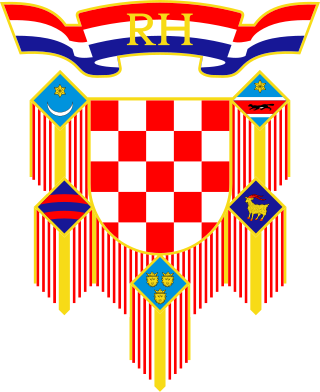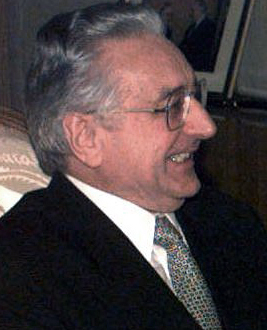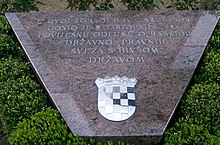
The president of Croatia, officially the president of the Republic of Croatia, is the head of state, commander-in-chief of the military and chief representative of the Republic of Croatia both within the country and abroad. The president is the holder of the highest office in Croatia. However, the president is not the head of the executive branch as Croatia has a parliamentary system in which the holder of the post of prime minister is the most powerful person within the country's constitutional framework and everyday politics.

Janko Bobetko was a Croatian general who had participated in World War II and later in the Croatian War of Independence. He was one of the founding members of 1st Sisak Partisan Detachment, the first anti-fascist military unit during World War II in Yugoslavia. He later had a military career in the Yugoslav People's Army (JNA).

Ivica Račan was a Croatian politician who served as Prime Minister of Croatia from 2000 to 2003, heading two centre-left coalition governments.

Ivo Sanader is a Croatian former politician who served as Prime Minister of Croatia from 2003 to 2009. He is currently serving a 18-year prison sentence for corruption in Lipovica prison.

The Social Democratic Party of Croatia is a social democratic political party in Croatia. The SDP is anti-fascist, progressive, and strongly pro-European. The SDP was formed in 1990 as the successor of the League of Communists of Croatia, the Croatian branch of the League of Communists of Yugoslavia, which had governed Croatia within the Socialist Federal Republic of Yugoslavia since World War II.

Zdravko Tomac was a Croatian politician.
The Plitvice Lakes incident was an armed clash at the beginning of the Croatian War of Independence. It was fought between Croatian police and armed forces from the Croatian Serb-established SAO Krajina at the Plitvice Lakes in Croatia, on 31 March 1991. The fighting followed the SAO Krajina's takeover of the Plitvice Lakes National Park and resulted in Croatia recapturing the area. The clash resulted in one killed on each side and contributed to the worsening ethnic tensions.

National Day is an annual public holiday and national day celebrated on 30 May in Croatia to celebrate the constitution of the first modern multi-party Croatian Parliament in 1990. As a national day and public holiday, it is a non-working day for all government employees and the majority of the labour force based in Croatia.

The Grand Order of Queen Jelena, or more fully the Grand Order of Queen Jelena with Sash and Morning Star, is an order of the Republic of Croatia. It was established in 1995. It ranks second in the Croatian order of precedence after the Grand Order of King Tomislav.

The Order of Duke Trpimir, or more fully the Order of Duke Trpimir with Neck Badge and Morning Star, is an order of the Republic of Croatia. It ranks sixth in the Croatian order of precedence after the Grand Order of King Dmitar Zvonimir. It is awarded to Croatian and foreign ministerial level officials and others for merit in contributing to the independence, integrity and international reputation of the Republic of Croatia, the construction of Croatia, and development of relationships between Croatia and other countries.
The Saborsko massacre was the killing of 29 Croat residents of the village of Saborsko on 12 November 1991, following the seizure of the village in a Yugoslav People's Army and Croatian Serb offensive during the Croatian War of Independence. The fall of the town occurred as part of a JNA and Croatian Serb operation to capture a Croatian-held pocket centered on the town of Slunj, southeast of Karlovac. While the bulk of the civilian population fled with the surviving Croatian forces, those who remained in Saborsko were rounded up and either killed or expelled. The bodies of the victims were retrieved from two mass graves and several individual graves in 1995.
On 25 March 1991, the presidents of the Yugoslav federal states SR Croatia and SR Serbia, Franjo Tuđman and Slobodan Milošević, met at the Karađorđevo hunting ground in northwest Serbia. The publicized topic of their discussion was the ongoing Yugoslav crisis. Three days later all the presidents of the six Yugoslav republics met in Split. Although news of the meeting taking place was widely publicized in the Yugoslav media at the time, the meeting was overshadowed by the crisis in progress, that would lead to the breakup of Yugoslavia.

Full diplomatic relations between Croatia and Israel were established on April 9, 1997 following Croatia's independence from SFR Yugoslavia. Croatia has an embassy in Tel Aviv and honorary consulates in Ashdod, Caesarea, Jerusalem and Kfar Shmaryahu. Israel has an embassy in Zagreb. Relations between the two countries are described as friendly and highly cooperative. In recent years, Croatia and Israel have intensified bilateral relations and defence and security cooperation. Croatia is one of the countries Israel occasionally turns to inside the EU to advocate on its behalf and it generally abstains or votes with Israel on key EU votes at the UN. Israeli president Reuven Rivlin described Croatia in 2019 as "Israel's strong ally in the EU, the UN and other multilateral organizations."

The bombing of the Banski Dvori was a Yugoslav Air Force strike on the Banski Dvori in Zagreb—the official residence of the President of Croatia at the time of the Croatian War of Independence. The airstrike occurred on 7 October 1991, as a part of a Yugoslav Air Force attack on a number of targets in the Croatian capital city. One civilian was reported killed by airplanes randomly shooting civilians of the Tuškanac city district and four were injured.
The Twelve Generals' Letter was an open letter, signed by twelve generals of the Croatian Armed Forces, that criticized the government, politicians and media for perceived criminalization of the Croatian War of Independence and asserted that war veterans had suffered undignified treatment. On 29 September 2000, a day after the letter was published by the Croatian media, Croatian President Stjepan Mesić reacted by sending into forced retirement all seven of the signatories who were active-duty officers. The affair was a source of significant controversy in Croatia and is considered one of the key events in Mesić's ten-year presidential incumbency.

The Armed Boats Squadron Dubrovnik was a volunteer unit of the Croatian Navy that ran the naval blockade during the siege of Dubrovnik which formed part of the Croatian War of Independence in 1991–1992. It consisted of 23 vessels, mostly of the runabout type, lightly armed and armoured. The unit was crucial in the defence of Dubrovnik, providing a resupply route for the Dubrovnik population and troops defending the besieged city. Boats assigned to the squadron transported approximately 6,000 troops and civilians, about 100 wounded and 2,000 tonnes of various cargo. A total of 117 personnel served with the squadron during the siege, suffering two fatalities.

The independence of Croatia was a process started with the changes in the political system and the constitutional changes in 1990 that transformed the Socialist Republic of Croatia into the Republic of Croatia, which in turn proclaimed the Christmas Constitution, and held the 1991 Croatian independence referendum.
Stara Gradiška prison is a former prison at Stara Gradiška, Croatia.
The Croatian Left has consisted of a broad range of individuals, groups, and political parties who seek egalitarian, economic, social and cultural rights in Croatia. Left-wing ideologies came to Croatia in the late 19th century during the Austria-Hungary regime. In 1894, the Social Democratic Party of Croatia and Slavonia was formed. It was the first workers party in Croatia at the time. In the Kingdom of Serbs, Croats and Slovenes the leftist movement grew but it was suppressed by the royal government. In 1920, the Communist Party of Yugoslavia was proclaimed illegal and its sympathizers were brutally persecuted after winning a large number of positions in the local elections. During the 1920s, Stjepan Radić and his Croatian Peasant Party led a centre-left agrarianism and anti-royalist policy. They were the leading Croatian political party at the time. After the assassination of Radić in 1929, the Croatian Peasant Party was taken over by Vlatko Maček who enforced a more conservative and nationalist rhetoric. During the Socialist Yugoslavia era, the League of Communists of Yugoslavia was the only legal party in the country. In 1990, political plurality was restored and a number of left-wing parties emerged with the most notable one being the Social Democratic Party of Croatia.












